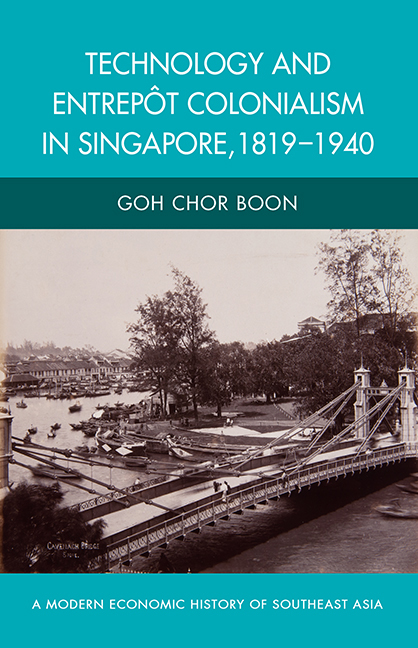Book contents
- Frontmatter
- Contents
- List of Figures and Tables
- Notes on Currency
- Introduction
- 1 Technology and the British Empire
- 2 Pioneers of Change: Entrepreneurs and Engineers
- 3 Maritime Technology and Development of the Port
- 4 Introducing Technological Systems
- 5 Sanitation and Public Health
- 6 Agriculture and Colonial Science
- 7 Food and Singapore Cold Storage
- 8 Politics of Imperial Education
- 9 Technology Transfer and Limited Industrial Growth
- Conclusion
- Bibliography
- Index
6 - Agriculture and Colonial Science
Published online by Cambridge University Press: 21 October 2015
- Frontmatter
- Contents
- List of Figures and Tables
- Notes on Currency
- Introduction
- 1 Technology and the British Empire
- 2 Pioneers of Change: Entrepreneurs and Engineers
- 3 Maritime Technology and Development of the Port
- 4 Introducing Technological Systems
- 5 Sanitation and Public Health
- 6 Agriculture and Colonial Science
- 7 Food and Singapore Cold Storage
- 8 Politics of Imperial Education
- 9 Technology Transfer and Limited Industrial Growth
- Conclusion
- Bibliography
- Index
Summary
During the nineteenth century, Western imperialists recognized the tremendous wealth — and power — that could be accrued from a systematic implementation of economic botany in their colonies. They were competing to discover, categorize, propagate, and exploit the wealth of plants from Asia and the Americas that had suddenly become available to them. By the late seventeenth century, the undisputed leaders in the field of economic botany were the Dutch, who had pushed aside the Portuguese to become the dominant European power in the East. The Dutch wanted to understand new plants for two main reasons: to find cures for the tropical diseases that were afflicting their sailors, colonists and merchants; and to find new agricultural commodities beyond the known spices, from which new wealth could be generated. They set up botanical gardens at their colonial outposts at the Cape, at Malabar, Ceylon and Java, and in Brazil, all which exchanged specimens with botanical gardens in Amsterdam and Leyden. Soon, England and France joined in the race. In this new field of “economic botany”, the pursuit of scientific knowledge went hand in hand with furthering the national interest. Botany was considered as “big science” during this period, an indicator of a country's might and sophistication. Indeed, some botanical gardens were even laid out in four quadrants, each representing Europe, Africa, Asia and the Americas. They were further subdivided into individual beds for particular plants. It was the dream of the imperial botanist to gather the world's plants in one place. In England, the Kew Gardens, set up in 1772, became the centre for botanical research in the British Empire. Around Kew revolved botanical stations set up in some colonies. These gardens were interlocked by a constant exchange of ideas, live plants and expertise. The objective of these colonial gardens was not, of course, the delectation of the inhabitants with beautiful flowers and trees. They were set up for the very practical purpose of experiments with new crops. Through its scientific study of plants transferred, the Kew Gardens and its satellite gardens in the colonies converted knowledge to economic gains and power which, in turn, contributed to making Britain as the number one industrial power in the world.
- Type
- Chapter
- Information
- Technology and Entrepot Colonialism in Singapore, 1819–1940 , pp. 143 - 167Publisher: ISEAS–Yusof Ishak InstitutePrint publication year: 2013

